Hikone Castle Honmaru 彦根城 本丸
|
|
|
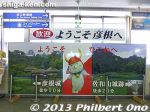
Welcome to Hikone, best known for Hikone Castle and mascot Hiko-nyan. At JR Hikone Station, this photo of official mascot Hikonyan greets you. Map
|
|

My 34-min. comprehensive English video about Hikone Castle, Genkyuen Garden, and autumn festivals.
|
|
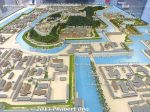
Scale model of Hikone Castle in the latter 18th and early 19th century.
|
|
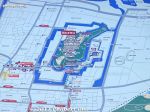
Map of Hikone. Hikone Castle is famous as being only one of five castles in Japan designated as a National Treasure. The tenshu castle tower is original, and you can enter it to get a good idea of what a real castle looked like.
|
|

Statue of Lord Ii Naomasa (井伊 直政 1561-1602 ) in front of JR Hikone Station in 2007.
|
|
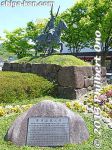
Statue of Lord Ii Naomasa (井伊 直政 1561-1602 ) in front of JR Hikone Station. One of the four great generals (徳川四天王) who helped Tokugawa Ieyasu win the Battle of Sekigahara (関ヶ原合戦) in 1600 to unify Japan and become shogun.
|
|
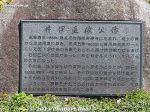
Ieyasu rewarded Naomasa with the strategic domain of Hikone (mainly Hikone, Maibara, Nagahama, Taga), making Naomasa the first Hikone daimyo (feudal lord 大名) in Omi Province (近江国).
|
|
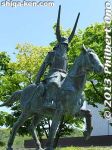
Sawayama Castle (佐和山城) came with the domain, but Naomasa did not like it, being outdated and the former castle of Ishida Mitsunari (石田 三成) who lost at Sekigahara.
|
|
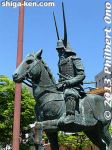
Naomasa planned to build a new castle, but died in 1602 from an old Sekigahara gunshot wound before construction began.
|
|

In front of Hikone Station, welcome banners for Hikone Castle's 400th anniversary in 2007 surround a statue of Ii Naomasa.
|
|
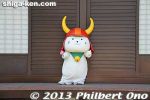
Hiko-nyan, the official mascot for Hikone Castle's 400th anniversary in 2007. He proven to be so popular that he has been retained as the city's official mascot. Basically a white cat with a horned samurai helmet. ひこにゃんOne of the most famous mascots in Japan.
|
|
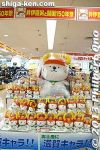
Hiko-nyan merchandise in Heiwado
|
|
|
|

During June 2008 to March 2010, the castle celebrated the 150th anniversary of Lord Ii Naosuke and the opening of Japan.
|
|

At the intersection, straight ahead is Gokoku Shrine (護国神社) dedicated to Shiga's war dead. You can go through the shrine or turn left toward Hikone Castle.
|
|
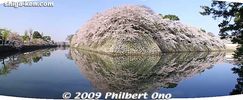
Come in the early morning and see Hikone Castle's moat water give a mirror reflection of the cherry blossoms. It's really beautiful on a sunny morning.
|
|
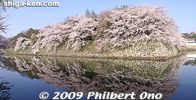
Naomasa's son Naokatsu was still an infant when Naomasa died. So Naomasa chief retainer consulted with Shogun Tokugawa Ieyasu and it was decided to build a new castle at the present location. Construction started in 1603.
|
|

Hikone Castle moat and cherry blossoms.
|
|

Since the construction of Hikone Castle was designated as a national project by the Tokugawa government, as many as 12 daimyo lords were ordered to assist in the construction.
|
|
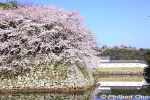
In 1606, the 1st and 2nd phases of Hikone Castle's construction were completed. The tenshu castle tower was also completed and Naokatsu moved in. This is the Castle moat and Ninomaru-Sawaguchi Tamon Yagura Turret.
|
|

In 1616, the construction's 3rd phase was begun to build the castle palace. Construction was henceforth carried out by local Hikone workers without outside help. The castle construction was completed in 1622.
|
|

Castle moat and Ninomaru-Sawaguchi Tamon Yagura Turret. Hikone Castle was home to a total of 14 Ii lords until Ii Naosuke. The Ii family remained close to the Tokugawa and the family head traditionally served as the Tokugawa government's Chief Minist
|
|

Hikone Castle was built with many structures and materials transferred other Shiga castles such as Otsu Castle, Nagahama Castle, Odani Castle, Kannonji, and Sawayama Castle. This greatly reduced the cost and time required to complete the castle.
|
|
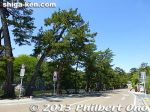
Iroha-matsu pine trees line the road to the castle.
|
|
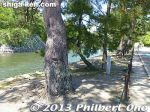
Some are Tosa (from Kochi Prefecture) pines whose roots do not protrude above ground.
|
|

Iroha-matsu pine tree and banner.
|
|

Iroha-matsu pine tree and sakura
|
|
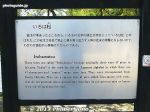
About the Iroha pine trees.
|
|
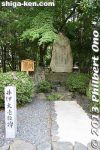
Lord Ii Naosuke Poetry Monument along the Iroha pine trees.
|
|
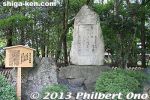
For New Year's in 1860, Naosuke had a formal portrait of himself painted by Kano Eigaku (狩野永岳) and wrote this poem above the portrait.
|
|
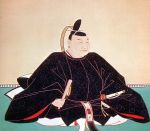
Ii Naosuke's portrait painted by Kano Eigaku (狩野永岳). He wrote the poem above the painting offered to Seiryoji temple in Hikone.
|
|

While using a metaphor of Lake Biwa's waves crashing relentlessly against a rocky shore, the poem expresses Naosuke's brain-wracking efforts as Chief Minister in dealing with successive waves of difficult problems.
|
|

Naosuke's poem in modern Japanese. For the sake of the country, he had no regrets. A few months later, he was assassinated.
|
|
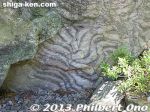
One of the large stones at the poetry monument has a duck carving.
|
|

Cherry blossoms, castle moat, and Ninomaru-Sawaguchi Tamon Yagura Turret.
|
|

From the Iroha pine tree road, you will see this Ninomaru-Sawaguchi Tamon Yagura Turret.
|
|

The Ninomaru Sawaguchi Tamon Yagura (二の丸佐和口多聞櫓) has left and right buildings that used to be connected by a bridge-like Sawaguchi Gate in the middle. A yagura was a storehouse (for weapons, etc.) that had a small watchtower or turret.
|
|

The left building is an Important Cultural Property rebuilt in 1771. It has a corner turret on the left end and we used to be able to enter it through a side entrance from behind.
|
|

Originally built in 1622, the Ninomaru-Sawaguchi Tamon Yagura Turret is designated as an Important Cultural Property by the Japanese government. Part of it was rebuilt in 1960.
|
|

Ninomaru-Sawaguchi Tamon Yagura Turret and cherry blossoms. Tamon yagura were long corridor-type turrets.
|
|

The right side of the turret is now the Kaikoku Kinenkan museum.
|
|
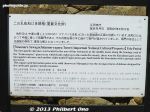
About the Ninomaru-Sawaguchi Tamon Yagura.
|
|

Ninomaru-Sawaguchi Tamon Yagura Turret with windows open.
|
|

The rear of the left-side and original Ninomaru-Sawaguchi Tamon Yagura Turret, before being opened to the public.
|
|

Being open to the public from 2008, the Ninomaru-Sawaguchi Tamon Yagura Turret now has a stairway on the right. (Update: This stairway is gone and the public cannot enter this turret.)
|
|

Ninomaru-Sawaguchi Tamon Yagura Turret
|
|

Banner for the 150th anniversary of Lord Ii Naosuke opening Japan to the world.
|
|

Inside Ninomaru-Sawaguchi Tamon Yagura Turret.
|
|
|
|
|
|
|

Ceiling structure inside Ninomaru-Sawaguchi Tamon Yagura Turret.
|
|

View of the other side of the rebuilt Ninomaru-Sawaguchi Tamon Yagura Turret (now a museum).
|
|
|

View of the Iroha road as seen from Ninomaru-Sawaguchi Tamon Yagura Turret.
|
|
|
|
|

Moat as seen from Ninomaru-Sawaguchi Tamon Yagura Turret. Iroha pine trees on left.
|
|

Moat as seen from Ninomaru-Sawaguchi Tamon Yagura Turret in spring.
|
|

View of castle grounds as seen from Ninomaru-Sawaguchi Tamon Yagura Turret. The Umaya Horse Stable is on the right.
|
|

Behind the Ninomaru-Sawaguchi Tamon Yagura Turret.
|
|

Behind the rebuilt Ninomaru-Sawaguchi Tamon Yagura Turret, now the Kaikoku Kinenkan museum.
|
|
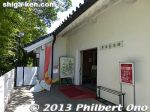
Entrance to Kaikoku Kinenkan museum.
|
|
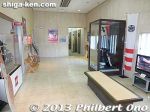
Inside Kaikoku Kinenkan museum.
|
|
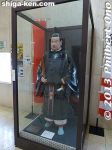
Statue of Lord ii Naosuke.
|
|
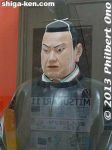
Statue of Lord ii Naosuke.
|
|

Inside the Kaikoku Kinenkan museum in 2007, the castle's 400th anniversary.
|
|

Photography is allowed only in this room of the museum.
|
|

Where Hiko-nyan's helmet design came from.
|
|
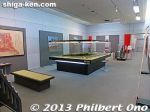
Scale model of Hikone Castle in Kaikoku Kinenkan museum.
|
|
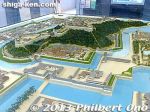
Scale model of Hikone Castle in Kaikoku Kinenkan museum.
|
|
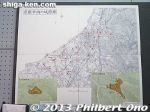
Red dots indicate old castle sites in Hikone.
|
|

Cross section of Hikone Castle.
|
|

Umaya Horse Stable (Important Cultural Property).
|
|

Umaya Horse Stable. The only castle in Japan to have a large horse stable intact. The L-shaped building originally extended further toward Omotemon Bridge.
|
|

Entrance to Umaya Horse Stable. Open to the public, free admission.
|
|
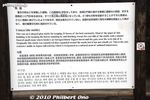
About the Umaya Horse Stable in English, Korean, and Chinese.
|
|

Behind the horse stable and Ninomaru-Sawaguchi Tamon Yagura Turret in the background.
|
|

Behind the horse stable.
|
|

Inside Umaya Horse Stable, open to the public for the 400th anniversary onward in 2007.
|
|

Dummy horse in the horse stable.
|
|

The stable is in remarkable condition, and the only one in Japan existing within a castle grounds.
|
|
|
|
|

In one Tora-san movie (starring Atsumi Kiyoshi) made in 1982, this is where he sold his goods.
|
|

Sign says Hikone Castle is one of the "Omi Hakkei" or Eight Views of Omi in spring.
|
|

Sign says Hikone Castle is one of the "Omi Hakkei" or Eight Views of Omi.
|
|

Omotemon Bridge and Gate 表門
|
|

Omotemon Bridge and cherry blossoms
|
|
|

Omotemon Bridge
|
|

Omotemon Bridge
|
|

Entrance to castle. The ticket office is where you pay castle admission. You can also buy a ticket set which includes admission to Genkyuen Garden (recommended). Open 8:30 am to 5 pm.
|
|

Time when Hiko-nyan (Hikone's official mascot) will appear today.
|
|

Kadomatsu decoration for New Year's. Hikone Castle Museum is in the background. During New Year's, they served free hot ama-zake (sweet sake) to all visitors.
|
|
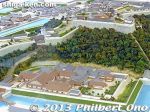
Scale model shows the Omote Goten Palace.
|
|

Entrance to Hikone Castle Museum. A reconstruction of the castle palace completed in 1987 to mark Hikone city's 50th anniversary. Admission charged.
|
|

Inside Hikone Castle Museum are samurai armor exhibits.
|
|

Ii clan samurai armor and helmet. Remember this helmet because it also appears on Hikone's official mascot Hiko-nyan (photos below).
|
|

About the Ii clan's samurai armor. It was all red.
|
|

Letter written by Ii Naosuke is also displayed in the Hikone Castle Museum.
|
|

Matchlock gun
|
|

Hikone Byobu folding screen is a National Treasure and exhibited for a few weeks in April-May. Read more here
|
|
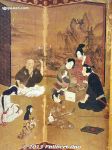
Hikone Byobu (彦根屏風) is a 17th-century National Treasure (国宝) folding screen. Painted on gold leaf, it shows a fashion-leading pleasure quarters scene in Kyoto (京都の遊里).
|
|
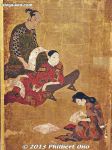
A variety of people, fashion, hairstyles, and objects from that era are depicted. See people playing the samisen, playing sugoroku Japanese backgammon, or writing a love letter.
|
|
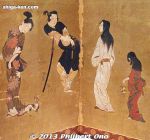
Notice the tobacco pipe and Western dog too. Artist is unknown, but likely belonged to the Kano school of Japanese painting (狩野派).
|
|
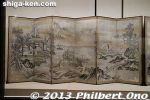
Other folding screens on display.
|
|
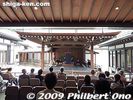
Another museum centerpiece is this Edo-Period Noh stage, the only original palace structure. Noh is performed in spring and autumn.
|
|
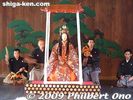
Noh play on the Noh stage inside Hikone Castle Museum.
|
|

The Hikone Castle Museum replicated the daimyo's living quarters that included this tea ceremony room.
|
|

Hikone daimyo's living quarters.
|
|
|
|
|
|
|
|
|
|
|
|
|
|
|
|

Biwa instrument displayed in Hikone Castle Museum.
|
|

Also this garden for the daimyo.
|
|
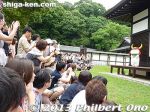
Hikone's super popular official mascot Hiko-nyan appears every day outside Hikone Castle Museum (photo) or in front of the main castle tower. A large crowd gathers each time.Hiko-nyan was the official mascot for Hikone Castle's 400th anniversary in 2007. He proven to be so popular that he has been retained as the city's official mascot.
|
|
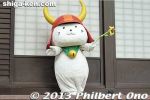
Hikone's official mascot Hiko-nyan appears three times daily for a 30-min. show: 10:30 am and 1:30 pm in front of the main castle tower (tenshu) and at 3:00 pm outside Hikone Castle Museum.According to legend, one day, Ii Naotaka, the third lord of Hikone Castle, was doing falconry in Tokyo and was near a temple when he saw this cat raising its paw. He was led inside the temple where he was able to rest inside. A major thunderstorm ensued, and the cat saved him from getting wet.
|
|
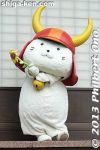
Hiko-nyan does not talk or even "meow." He speaks through a handler or translator. Basically, he (or it) just struts around and makes cute poses with or without a prop.Another legend says that as soon as the cat beckoned Naotaka into the temple, lightning struck the tree where he was standing. Thus, the cat saved his life.
This legendary cat connection gave birth to the idea behind Hiko-nyan. This same legend is also one theory for the origin of the ubiquitous beckoning cat you see at shops and restaurants in Japan. The beckoning cat can be called Hiko-nyan's cousin.
|
|
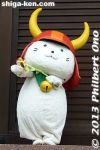
"Hiko" refers to Hikone, and "nyan" is a baby word for cat. Hiko-nyan's appearance schedule is here.If it rains, Hiko-nyan appears at the Castle Museum. Hiko-nyan is a white cat wearing a red samurai helmet with horns, modeled after the one worn by Lord Ii Naomasa, the first lord of Hikone Castle.
Hiko-nyan also makes guest appearances at various events to promote Hikone. He has even traveled to Hawaii to appear in a Japan parade in Waikiki.
|
|
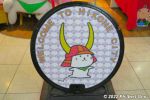
Hikone manhole with Hiko-nyan. Found in the tourist info office in Yobancho, Hikone.
|
|

Hikone Castle admission fees in 2017.
|
|

Omotezaka Path to castle tower. Not good for wheel chairs or those who don't like to climb stairs.
|
|

Rokabashi Bridge (廊下橋) goes to the Tenbin Yagura (天秤櫓) whose stone wall differs between the left and right.
|
|

Bridge to Tenbin Yagura turret
|
|

Under the bridge to Tenbin Yagura turret.
|
|

Under the bridge to Tenbin Yagura turret.
|
|

Rokabashi Bridge (廊下橋) going to the Tenbin Yagura (天秤櫓) could be demolished in case of enemy attack. Tenbin Yagura's stone wall differs between the left and right.
|
|

Tenbin Yagura turret on the left.
|
|
|

Left end of Tenbin Yagura turret.
|
|

Tenbin Yagura's left side has shaped stones fitting together using a newer technique (otoshi-zumi 落し積み) when repaired in 1854.
|
|

The name Tenbin refers to its similarity to a tenbin shoulder pole for carrying a piece of luggage tied to each end. Both east (right) and west (left) ends of the building has a two-story watchtower turret. They look symmetrical, but are not identical.
|
|

Tenbin Yagura
|
|

The tenbin Yagura turret is said to have come from Nagahama Castle. (Important Cultural Property) 天秤櫓
|
|

Tenbin Yagura turret in spring. This is also one location where the film Idai Naru, Shurararabon (偉大なる、しゅららぼん The Great Shu Ra Ra Boom) was filmed.
|
|

Right side of Tenbin Yagura turret in spring with cherry blossoms.
|
|

Tenbin Yagura's right side has natural, unshaped stones (gobo-zumi 牛蒡積み) with small stones in the gaps.
|
|
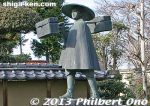
Tenbin Yagura is named after the luggage-carrying shoulder pole like this Omi merchant.
|
|
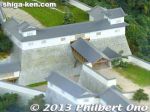
Tenbin Yagura's Rokabashi Bridge had a roof.
|
|
|
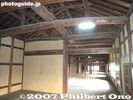
Inside Tenbin Yagura turret now open to the public since 2007.
|
|
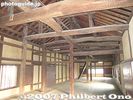
Inside Tenbin Yagura turret
|
|

Under the right turret inside Tenbin Yagura. Stairway (closed to public) to 2nd floor of right turret.
|
|
|
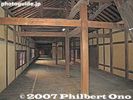
Inside Tenbin Yagura turret, looking toward the left turret.
|
|

View of the bridge from Tenbin Yagura turret.
|
|

View of the bridge from Tenbin Yagura turret.
|
|

Rear view of Tenbin Yagura turret.
|
|

Rear view of Tenbin Yagura turret. The middle door also serves as an entrance.
|
|

Steps to Taikomon Gate.This is also one location where the film Idai Naru, Shurararabon (偉大なる、しゅららぼん The Great Shu Ra Ra Boom) was filmed. Where Kiyoko rides her horse up the steps.
|
|

Path to Taikomon Gate.
|
|

On the way to the main castle tower (tenshu), you can take a tea break at this small tea house called Choshoan (聴鐘庵).
|
|

For ¥500, you can try matcha tea and a small confection. It’s operated by members of a tea school started by castle lord and tea master Ii Naosuke.
|
|

Choshoan tea house was originally the bell ringer’s rest house.
|
|

Another room in Choshoan.
|
|

Matcha tea and confection at Choshoan tea house, Hikone Castle.
|
|

Time-Keeping Bell or Jiho-sho. It is rung five times daily at 6:00, 9:00, 12:00 noon, 15:00, and 18:00. Also see my YouTube video here.
|
|

Time-Keeping Bell. The bell was recast in 1844. 時報鐘 - Jihosho. Next to the bell is a tea house called Choshoan. The 13th lord of the castle, Ii Naosuke was a diligent practitioner of the tea ceremony.The famous phrase "Ichigo Ichie" (One Encounter, One Chance) was coined by him in a tea ceremony book titled "Chanoyu Ichie-shu" (茶の湯一会集).
|
|

Steps leading to Taikomon Gate. Before that, you can pay to have tea under the red umbrella front of the tea house and Time-Keeping Bell.
|
|

Steps to Taikomon Gate.
|
|

English information sign for Taikomon Gate.
|
|

The info sign also has a sticker with a QR code to be read by your compatible cell phone. You can then access the respective URL and see more information.
|
|

Taikomon Yagura Turret. This is the gate right before you reach the main castle tower. "Taikomon" means Taiko Drum Gate. It had a taiko drum that was beaten to convey signals to the inner castle. Important Cultural Property. 太鼓門
|
|

You can enter Taikomon Gate which is an exhibition room for photos of Japanese castles and a model of Hikone Castle.
|
|

Inside Taikomon Gate.
|
|
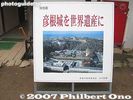
Sign outside the Taikomon Gate indicating the city's project to have Hikone Castle be designated as a World Heritage Site.
|
|

Hiko-nyan cutout in front of Hikone Castle. He appears daily.
|
|

Hiko-nyan appears outside the Taikomon near the main Hikone Castle tower.
|
|

Finally you see the main castle tower or Tenshukaku. Hikone Castle was completed in 1622 after 20 years of construction by Lord Ii Naotsugu who started building the caslte in 1603 upon his deceased father Naomasa's wish.
|
|

Hikone Castle's main tower is said to be originally the castle tower for Otsu Castle whose lord was Kyogoku Takatsugu. It was moved here in 1606. This main tower is designated as a National Treasure.
|
|

Hikone Castle is one of five main castle towers in Japan designated as a National Treasure. The others are Himeji, Matsumoto, Matsue, and Inuyama Castles.
|
|

Although it was the most prominent building, the daimyo did not live in it. It was mainly a glorious symbol and storehouse for samurai armor and other artifacts of past Hikone daimyo.
|
|

During 1957 to 1960, this castle tower was disassembled and repaired.
|
|

Hikone Castle has bell-shaped windows at the top.
|
|
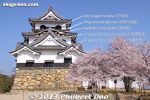
A major reason why Hikone Castle is a National Treasure is because it has many different types of roof features on one building.
|
|
|

Since Naomasa's son Naotsugu (井伊 直継) was too young, Chief Retainer Kimata Morikatsu (家老 木俣守勝) acted on his behalf to plan the new castle's construction. Upon the approval of Shogun Tokugawa Ieyasu, Mt. Hikone on the shore of
|
|

Construction of Hikone Castle started in 1604 as an urgent national project ordered by Ieyasu to deter any rebellious daimyo in western Japan and to protect Kyoto, the Imperial Capital.
|
|

Many daimyos assisted during the early phase. Most of the structures and stones came from defunct castles in Omi like Otsu, Nagahama, Odani, and Sawayama to reduce the construction time and cost.
|
|

Central compounds like the Kanenomaru and Honmaru and the main castle tower were completed within a few years and teenager Lord Naotsugu moved in from Sawayama Castle.
|
|

The castle was finally completed by the Ii clan in 1622. Hikone Castle was the government seat and residence of the Hikone daimyo who ruled the Hikone domain and a few domains in Edo (Tokyo).
|
|

Although it was a military fortress, Hikone Castle never saw battle and was mainly a symbol of authority.
|
|

Hikone was important as the crossroads of the Nakasendo Road (中山道) to Kyoto and Hokurikudo Road (北陸道) to the northwest. It also linked the roads to boat transportation on Lake Biwa for Kyoto.
|
|

As one of the inner-circle fudai daimyo (譜代大名), the Ii clan continued to be influential in the Tokugawa shogunate.
|
|

After the demise of the Tokugawa and the restoration of Imperial rule in 1868, castles were ordered to be demolished. Hikone Castle was also being dismantled when Emperor Meiji visiting in 1878 spared the castle.
|
|
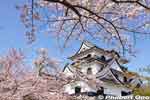
A number of structures were thus saved, including the main castle tower. In 1944, the Ii family donated the castle to the city of Hikone.
|
|
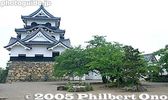
Hikone Castle is a designated Special National Historic Place (特別史跡).
|
|

Hikone Castle and plum blossoms.
|
|
|
|

Hikone Castle and plum blossoms.
|
|
|

Plum blossom ume tree given by the city of Mito in Ibaraki Prefecture.
|
|

Front view of Hikone Castle tower 天守閣
|
|

The castle tower is not as large as Himeji or Matsumoto, but the construction on the inside is original.
|
|
|
|
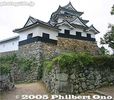
The rear of the castle tower.
|
|

Entrance to castle tower
|
|

This is how crowded it can get to enter Hikone Castle's main tower. This was on a Sunday during Golden Week.
|
|
|
|
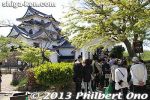
People line up to enter Hikone Castle's main tower.
|
|
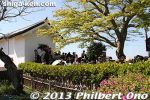
People line up to enter Hikone Castle's main tower.
|
|

Entrance to tower. There are a few very steep staircases. Wearing high heels and miniskirts are not recommended.
|
|

Ceiling of Hikone Castle tower.
|
|

Corridor
|
|
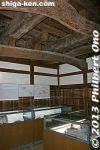
Display cases of castle artifacts.
|
|

Corridor
|
|
|

View from Hikone Castle tower
|
|
|

Top floor. The windows are small and it's difficult to get a good shot of the view. There is also no balcony to go outside on the top floor.
|
|

Top floor ceiling.
|
|

View from castle tower
|
|

View from castle tower, looking toward Nishinomaru during cherry blossoms season.
|
|
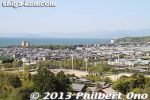
View from Honmaru compound, looking toward Lake Biwa.
|
|
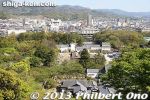
View from castle tower, looking toward central Hikone with the castle museum in the foreground.
|
|

View from castle tower, Takeshima in Lake Biwa. Takeshima is a small island near Hikone. 多景島 Photos here.
|
|
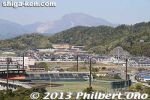
Mt. Ibuki, Shiga's highest mountain a seen from the Honmaru compound.
|
|

Another exit is this Kuromon Gate. This might be a better exit if you also want to visit Genkyuen Garden (recommended). 黒門
|
|

Moat as seen from Kuromon Gate.
|
|
|
|
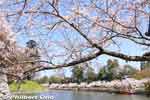
Moat near Genkyuen Garden.
|
|
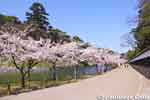
Moat and cherry trees next to Genkyuen Garden.
|
|
|
|
|

Nigiwai-ichi local goods shop set up in spring.
|
|

Tent selling local goods during spring.
|
|
|

Statue of Ii Naosuke near the Hikone Castle moat. Lord of the castle and also an important historical figure. 井伊 直弼Ii Naosuke was the Tokugawa shogunate's Chief Minister (Tairo) who favored and concluded commercial treaties with the Western powers and thus broke Japan's isolation from the world. Foreigners were then allowed to trade with Japan and take up residence in cities like Yokohama and Hakodate. Ii was later assassinated in 1860 by samurai radicals from Mito (Ibaraki) who sought to oust the foreign "barbarians."
|
|

Postcard of Commodore Perry and Ii Naosuke to mark the 50th anniversary of Yokohama Port's opening in 1909.Also see Gotokuji temple in Setgaya, Tokyo where Naosuke is buried. http://photoguide.jp/pix/thumbnails.php?album=646
|
|

Map of Hikone Castle as it is today.
|
|

Hikone Castle as seen from Genkyu-en Garden. Genkyu-en is a Japanese garden next to the castle.
|
|
|
|

Hikone Castle as seen from Genkyuen Garden during autumn at night.
|
|

Hikone Castle tower lit up at night.
|
|

Hikone Castle tower lit up at night.
|
|
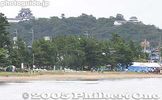
Hikone Castle as seen from Matsubara Beach.
|
|
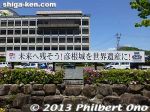
Hikone City Hall with a sign urging Hikone Castle to become a World Heritage Site.
|
|
|
|
|
|